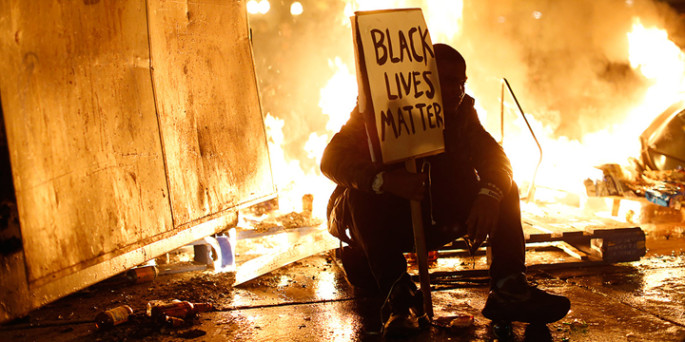
Black lives matter, but not to all
MIAMI – Scathing. That’s the word used by most of the media to characterize the report issued last week by the U.S. Department of Justice (DOJ) on race and policing in Ferguson, Missouri. That’s the city near St. Louis where the unarmed black teenager, Michael Brown, was shot to death last summer by Darren Wilson, at the time a Ferguson police officer. He subsequently resigned.
The killing sparked widespread protests in Ferguson and across the country. While DOJ failed to find sufficient evidence to charge the former officer with a crime, its report on the racist practices employed by police in Ferguson is damning. According to one media account:
“The U.S. Department of Justice on Wednesday released its full report from an investigation of the police department in Ferguson, Missouri, which was launched after the death of Michael Brown last summer. DOJ officials found that police officers and city officials in Ferguson have routinely violated the constitutional rights of the city’s African-American residents and made racist jokes in their city email accounts, including one about President Barack Obama.”
The data speak volumes. The population of Ferguson is 67 percent black. Yet African-Americans make up more than 90 percent of arrests and traffic stops. While blacks are routinely stopped for petty crimes like jaywalking and parking violations, the police rarely stop whites who commit the same offenses.
Racist actions are usually driven by shared racist attitudes. In this regard, the climate of blatant racism and impunity uncovered by the DOJ investigation into the Ferguson PD is shocking. Among other things, police officers and court supervisors exchanged vile racist emails during work on their official accounts. One of them depicts President Obama as a chimpanzee. Another, probably from National Geographic, shows a group of bare-chested African women. The accompanying text? “Michelle Obama’s high school reunion.”
The Justice Department reports that, rather than meting out punishment to the perpetrators, supervisors in Ferguson seemed to find such revolting and sophomoric attempts at humor funny. No wonder that the Ferguson police chief told the Justice Department that he can’t remember a single time when he disciplined a police officer.
The pattern of racial discrimination in police actions, the racist attitudes, and the routine impunity just described sets in context the furious and on occasion violent reaction of the black community of Ferguson. The police killing of Michael Brown was merely the last straw in a long history of abuse and disrespect of African Americans by local police. Long-pent up grievances and the reality of powerlessness was the powder keg. The killing of Brown was the spark. Given all that, it’s a miracle – in no small measure due to the words and actions of local and national black leaders – that the conflagration was not much worse.
The Justice Department report has been the source of both a feeling of vindication and of utter frustration for Michael Brown’s parents and the whole community. The feds confirmed that the racism they have experienced is real.
The DOJ found that the Ferguson police department is infected with racism. But, residents ask: Wasn’t Darren Wilson an officer in that very department when he killed Michael Brown under dubious circumstances? Did Wilson remain unaffected by the racist climate all around him? So why isn’t Justice prosecuting him?
The answer is that in order to secure a conviction of Wilson, Attorney-General Eric Holder and his Justice Department would have to jump over two very high hurdles. The first is that the law sets a very high bar in a trial involving a violation of civil rights leading to death. The government must prove that a killing was motivated by bias. And that’s hard to do except in the case of members of the KKK or other vocal, virulent racists.
The second hurdle is “jury nullification.” That’s when a jury refuses to convict despite convincing evidence. The most often cited case is the murder trial of O.J. Simpson. The theory there is that a jury made up mainly of black women didn’t trust the cops or the evidence, disliked the prosecutor, and most of all they didn’t want to convict an African American hero.
In reality, most cases of jury nullification are nothing like the O.J. Simpson case. A lot of jury nullification involves cops as defendants. Juries in most cases are unwilling to convict police officers. Even in the case of the merciless beating of Rodney King in Los Angeles in the early 1990s, which was captured on video, the officers were all acquitted. One could cite countless similar cases, including the killing of Arthur McDuffie in Miami more than a decade earlier. In both cases, the acquittals resulted in race riots of such violence and destructiveness that they make Ferguson look like a brush fire.
This time what has arisen is a national movement under the banner “Black Lives Matter.” It’s a truth that should be instilled in every police officer and every child in the country.
Yet we are daily reminded how far this nation is from living by that ideal. Since Ferguson, there have been several unprosecuted police killings of unarmed black men over the pettiest of crimes (small-scale selling of untaxed cigarettes) or no crime at all (sitting on the stairs of your apartment building talking to your girlfriend).
Beyond policing, the ideal that black lives matter is routinely violated in our society in myriad other ways. In the face of great racial disparities on every dimension of well-being there have come brutal cuts in social programs to aggravate the problem. Do black lives really matter to the politicians who champion these policies? In a word: No!

